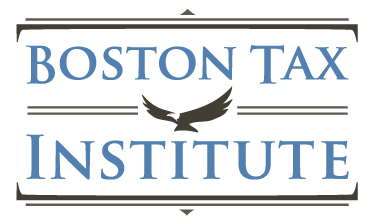Originally published on Passive Activities and Other Oxymorons on May 31st, 2011.
____________________________________________________________________________
Boston Tax Alert 2011-24,2011-25, 2011-26
Lu Gauthier of The Boston Tax Institute has given me permission to republish his newsletter. The BTI newsletter is a regular feature of this blog now going up every Tuesday. Be sure to check out the BTI catalog for great CPE value. These are going up a little late because of the holiday.
Our thanks to Steven Cohen, Esq. for the following email!
The Massachusetts Legislature has enacted a new law that will increase homestead protection for homeowners in Massachusetts. Homestead protects a person’s residence from most creditors. If a homeowner is sued by a creditor or files for bankruptcy, a portion of their equity in their home – the “homestead estate” – is deemed unavailable to their creditors. The new law was passed on December 16, 2010, and became effective on March 16, 2011.
The new law provides that Massachusetts homeowners’ property will automatically be protected from debt collectors up to $125,000, provided they occupy or intend to occupy their home as their principal residence and that they hold that much equity in their properties. Prior to this statute, homeowners only received this protection if they filed a declaration of homestead with the Registry of Deeds. The new law makes this protection automatic for up to $125,000. Homeowners may still file a separate declaration of homestead with the Registry of Deeds, which will provide additional protection of up to $500,000.
If the homeowners are over age 62 or disabled, each owner is entitled to the full exemption amount of $500,000 resulting in protection of up to one million dollars for an older couple. If they are under 62 years old or not disabled, the total exempt amount allowed for a couple will be $500,000.
The new Homestead law as it applies to elders will be discussed by Steve in Medicaid Planning on 6/20 in Waltham. The entire new Homestead law will be discussed in detail by Lisa Delaney, Esq. in our 1/2 day seminar entitled New MA Homestead Exemption on 6/21 in Randolph.
————————————————————————————————————-
An issue that has arisen in a number of recent IRS examinations is whether the taxpayer should extend the statute of limitations. My position continues to be that in most cases the statute of limitations should NOT be extended. An extension just gives the examining agent more time to develop his issues and to examine other tax years. If an extension were to be given, it should only be for a very short duration such as a few months in order to allow the agent to finalize the case and write up his report. In hindsight, in most cases, it appears to have been a major error of judgment to have extended the statute of limitations! This and other scintillating issues will be discussed in detail in our seminar entitled How to Handle an IRS Audit / Appeals Conference on 6/1 in Waltham.
PAOO Comment: The above is from Lu Gauthier himself. BTW his instructors are all quite good (well except maybe for the time I did a course), but I don’t think I am doing them injustice when I say that Lu, himself, is probably about the best.
———————————————————————————————————————————–
Herb Daroff provided the following questions to ask CPAs to spark interest in his seminar on Business Succession Planning on June 7:
Who’s going to own your client’s business after you?
What is your client’s business succession plan?
Closely-held family-owned private businesses come in four varieties:
1. ONE OWNER — with NONE of his or her children active in the business to succeed him or her in ownership or management.
Most SELLERS want far more than a BUYER will pay.
SELLERS want enough so that they can afford to retire.
The SELLING stockholder also is frequently a RETIRING key employee.
Learn how to take advantage of EMPLOYEE benefits which are far more tax efficient than EMPLOYER benefits.
2. ONE OWNER — WITH one or more of his or her children active in the business to succeed him or her in ownership or management.
The most common plan is for the child(ren) to BUY the business from their parent.
This is the LEAST tax effective way to accomplish this!
Learn the right way to transfer a business from generation to generation.
3. MULTIPLE OWNERS — with NONE of their children active in the business to succeed them in ownership or management.
Cross-Purchase Agreements are far more tax efficient than Redemptions.
However, both result in paying estate taxes on far more than the business is worth
150% if 2 equal owners,
183.33% with three equal owners, etc
Learn how to create Estate Enhanced Cross-Purchase Arrangements.
4. MULTIPLE OWNERS — WITH one or more of their children active in the business to succeed them in ownership or management.
These are typically the largest and most complicated cases.
Learn how to separate VOTE, from EQUITY, and from INCOME in order to develop the most effective plan from a tax, legal, financial, and people point of view































































































